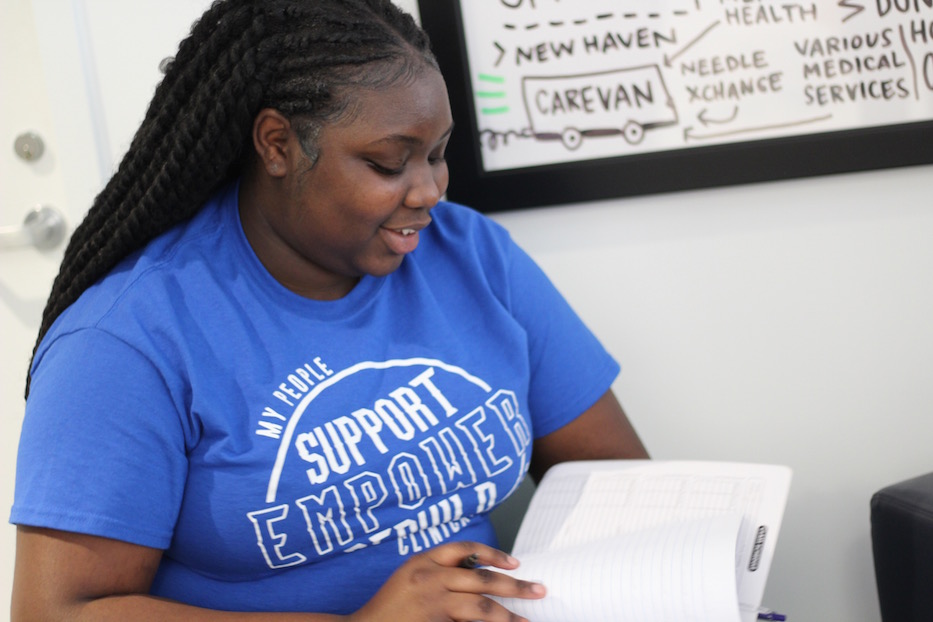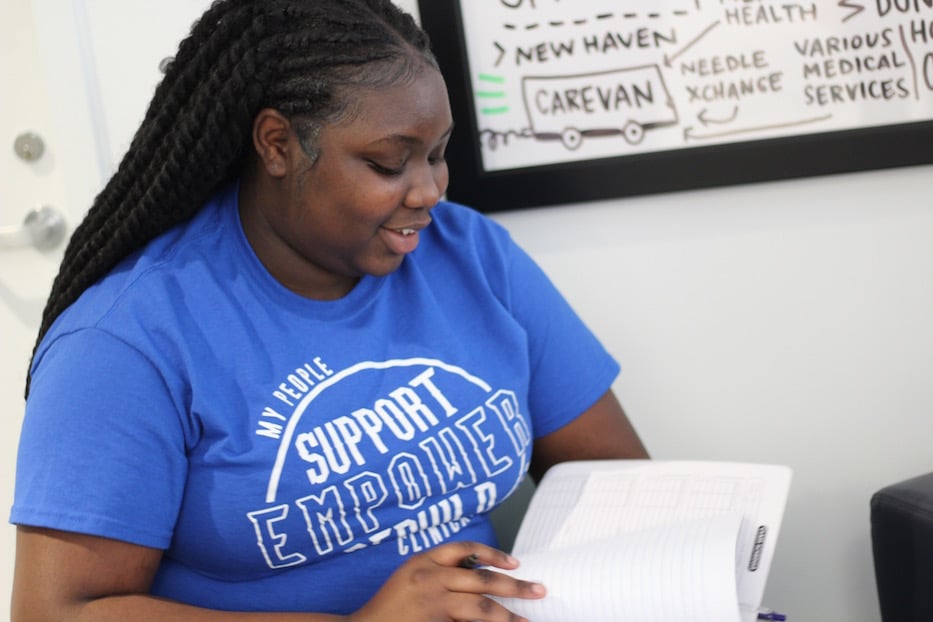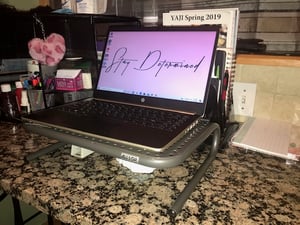
Co-Op High School | New Haven Public Schools | COVID-19 | Education

Jamiah Green at the New Haven Free Public Library in April 2019, well before Covid-19 was on her radar. Lucy Gellman File Photo.
School days don’t look like they used to. Most days, I get up between 6:30 and 7 a.m. and head to a learning station at the kitchen table. My teachers join at 7:30 a.m. on Google Meet. It’s the beginning of six to seven hours in front of a screen. By the end of it, there are new homework assignments, chapters to be read, papers to be written and completed.
But that’s not the end of the day. When I’m done with school, I head to work.
My name is Jamiah Green, and I’m a senior at Cooperative Arts & Humanities High School, or Co-Op. This year, I am one of New Haven's many high school students toggling between school and part-time work in the midst of the Covid-19 pandemic.
Before coronavirus hit schools in March, I got up at 5:30 in the morning to make the Congress Avenue bus at 6:10 a.m. The bus travels almost an hour from West Haven into New Haven, where it drops its riders off at the New Haven Green. By 7 a.m., I was walking through Co-Op’s doors. There was breakfast in the cafeteria, followed by the first class of the day at 7:30 a.m.
It was early—but it was also kind of the best. I loved the packed hallways and full classrooms. I was excited to greet my teachers in person, which now feels like a novelty. As we sat in rows of desks, I could see which of my classmates understood the work, and who was struggling with the material or felt isolated.
Teachers could see it too, and would often stop the class to answer a question. In many of my classes—AP Statistics, for instance—we would look at a problem and solve it together. When I ask a question online, I often feel like I’m the only one in the room that doesn’t get the work.
At lunchtime, my friends and I would sit at a table together and make jokes. We didn’t have classes together, so it was often the only time of the day we got to see each other. Now, the majority of our connections are Phone calls or FaceTime and social media.
When schools closed in March, I was initially excited—my friends and I thought we’d have a brief vacation from school. None of us thought Covid-19 would last this long: some of my peers initially thought closures were an overreaction. Then a matter of weeks became months. Our excitement turned into anxiety. That feeling hardened the longer we were out of school—and the more we struggled to keep up.
Let me give you an example. On the last day of in-person classes—March 12, 2020—I was turning a corner in AP Statistics and AP Literature. In hopes of improving my work, I had been staying up late into the night studying, taking color-coded notes to memorize information, and completing extra credit whenever there was the option. When I saw my grade as a B for Marking Period 3, I thought that I would end my junior year off with an A. I was wrong.

When classes moved online, it was as if everything I taught myself to improve and focus went out the window. Nerves took over my body when I logged in to class and listened to a teacher talking at us through a screen. I didn’t understand the material, and didn’t know how to ask for help when students logged off. I finished the year with a D, and a low score on both of the AP exams.
In May, I applied for jobs in the hopes of feeling more financially stable. In June, I started working part-time at a a fast food chain in North Haven. During the summer, it was often the only thing that got me out of the house, and something that I started looking forward to. I liked the routine: glove up, mask up, hop on the register or smooth out an order at the fry station. At home, my grandmother and I had a system to keep each other safe: we keep a jug of hand sanitizer by the door, and try to hop in the shower when we get home.
Then the school year started. In the beginning, I would get up at 6 a.m and do my daily routine: get in the shower, brush my teeth, dress comfortably. I’d open my laptop to play music, clean my room, and prep my desk with snacks and supplies in order to start my school day. I was determined to finish the year with stronger grades.
But work—job work, not school work—was a constant presence. Most days, I would leave my last period an hour early, so that I could get dressed for my job and head out. I’d get home at around 10 or 11 at night, quickly jump into the shower, and finish up some homework by 1 a.m. Then I would go to bed, and start my day over. I was exhausted. I felt overwhelmed. Things started to take a turn.
The assistant manager started to call me in on my weekdays off, and schedule me at times where I couldn’t join my last period class at all. Some evenings, I didn’t get home until midnight. I tried to stay up until my homework was done, and ended up sleeping through my earliest classes the next morning. Sometimes I’d fall asleep with my uniform still on, my school work and laptop all over the place. I lost motivation. I struggled to focus. I started failing the majority of my classes.
Within the second to third week of the semester, I also started experiencing WiFi connection issues. I could no longer keep up with or understand the schoolwork, and could feel the anxiety rising in my body. Meanwhile, I had started looking into colleges, and felt that I had no chance of getting in. I had trouble connecting with my college counselor for months. Ultimately, it was my cousin, who is also in her senior year of high school, who helped me complete applications.
When schools announced that we were going to return at the beginning of November, I felt a rush of mixed emotions. Covid-19 cases were spiking even as the Board of Education discussed a potential return. I didn’t want to get sick, or risk bringing the virus into the house. But I also wanted to get back into the classroom. I wanted to feel like I understood my schoolwork again. When the board paused the reopening at the end of October, I felt both relieved and sad.
Without an in-person return date, things still started coming together. I started talking to my friends and teachers about needing help in the classroom. A new manager at work urged me to focus on classes and design my work schedule around my academic one, instead of the other way around.
Earlier this month, I cut back hours at her suggestion. I’m finishing work that is still due in classes. I’ve realized that I need a circle of support, including a cousin who is in my “quarantine pod.” I’m hoping for college acceptance letters.
It’s still a balancing act. I think for many students, it’s frightening how easy it is to fall into a depression right now. If it wasn’t for the help and concern from my close friends, family, and teachers, I wouldn’t have been able to catch up and be where I am today.
I wanted to share my story so that I can let others teenagers like me know that you are not going through this alone. Reach out. Ask for help. Let your friends and teachers know what’s going on.

